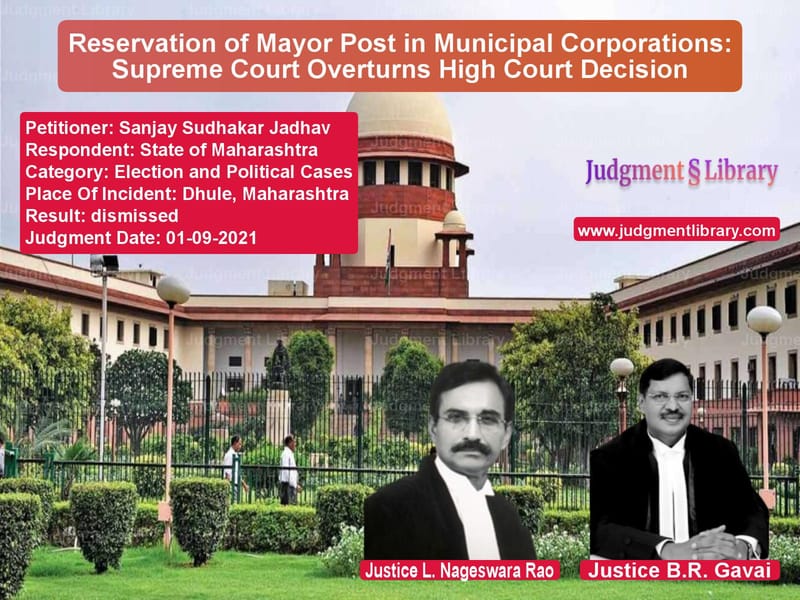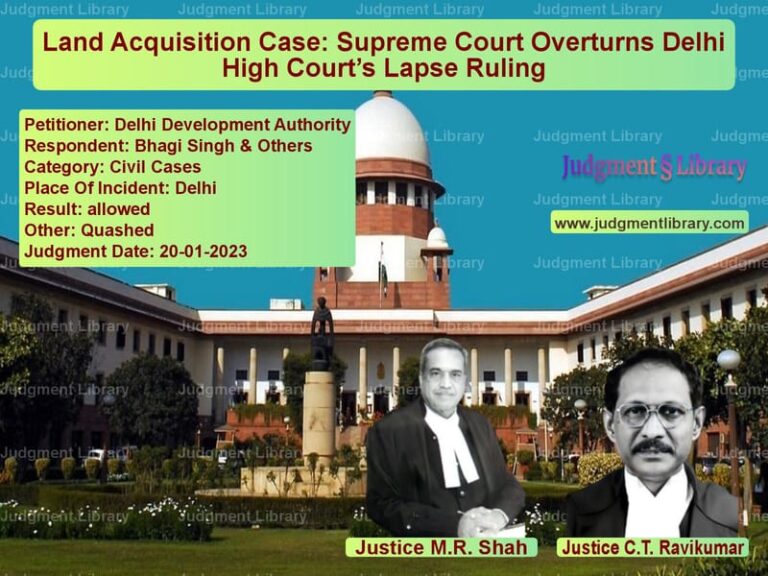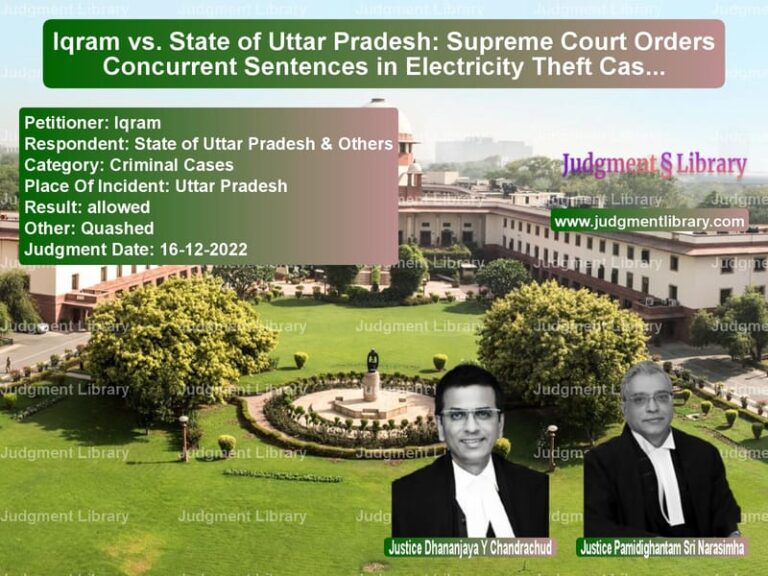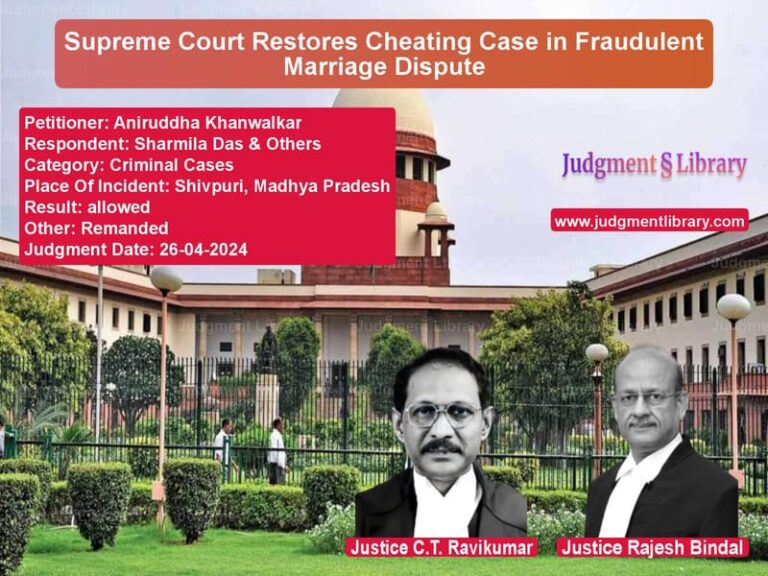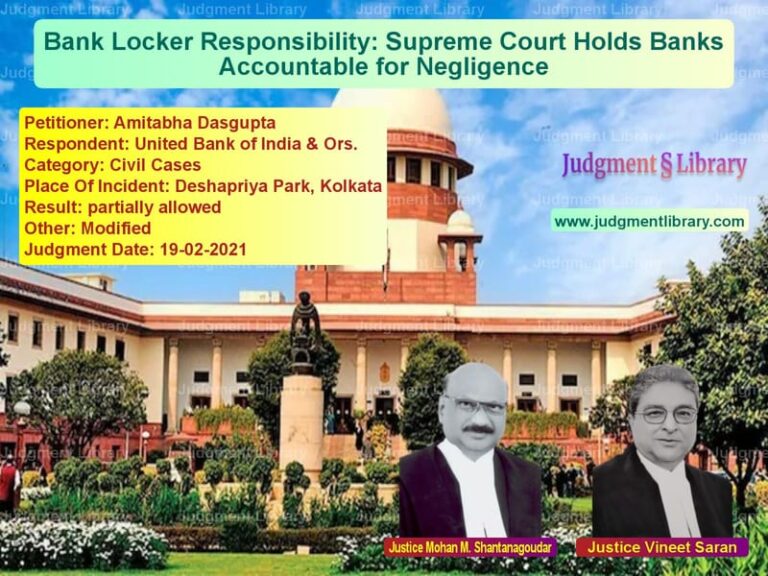Reservation of Mayor Post in Municipal Corporations: Supreme Court Overturns High Court Decision
The case revolves around the reservation of the office of the Mayor in Dhule Municipal Corporation, Maharashtra. The primary legal question was whether the repeated reservation of the Mayor’s post for the Backward Class category violated the rotation policy prescribed under the Maharashtra Municipal Corporations (Reservation of Offices of Mayors) Rules, 2006. The Supreme Court was called upon to determine whether the reservation policy was applied correctly and whether the decision of the High Court to quash the reservation was justified.
Background of the Case
The Dhule Municipal Corporation, like other municipal corporations in Maharashtra, follows a system of rotation for the reservation of its Mayor’s post. As per a notification issued by the State Government on November 27, 2019, the Mayor’s post for the term starting in June 2021 was reserved for the Backward Class category.
A challenge was raised against this notification by Sanjay Sudhakar Jadhav, who argued that since 2003, the Mayor’s post had been reserved for the Backward Class on multiple occasions, while it had never been reserved for the Scheduled Caste category. The Bombay High Court agreed with this argument and quashed the reservation, directing the State Government to reconsider the process.
Key Legal Issues
- Whether the reservation of the Mayor’s post in Dhule Municipal Corporation violated the principle of rotation.
- Whether the High Court was correct in directing the State Government to reconsider the reservation process.
- Interpretation of Rule 3(2) of the Maharashtra Municipal Corporations (Reservation of Offices of Mayors) Rules, 2006.
Arguments of the Appellants
The appellants, including municipal councillors from the Backward Class and the State of Maharashtra, challenged the High Court’s decision. Their arguments were as follows:
- The High Court failed to consider the proper interpretation of Rule 3(2), particularly clauses (d) and (e), which allow for the reservation of the Mayor’s post for the Backward Class even if it had been reserved previously.
- Out of 27 Mayor’s posts across the state, 3 were reserved for Scheduled Castes and 7 for Backward Classes. Given that the number of Backward Class reservations is more than double that of Scheduled Castes, it is possible that a particular category may not receive reservation in every cycle.
- The draw of lots conducted by the State Government followed the prescribed rules and excluded municipalities that had previously been reserved for a particular category.
Arguments of the Respondents
The original writ petitioner, Sanjay Sudhakar Jadhav, argued that:
- The repeated reservation of the Mayor’s post for the Backward Class in Dhule Municipal Corporation violated the principle of rotation.
- The High Court correctly interpreted Rule 3(2)(e) of the Maharashtra Municipal Corporations (Reservation of Offices of Mayors) Rules, 2006, to mean that until every eligible category receives representation, a category that has already been reserved cannot be repeated.
- Since the Scheduled Caste category had never been granted reservation in Dhule Municipal Corporation, it was unfair to continue reserving the post for the Backward Class.
Supreme Court’s Analysis
The Supreme Court, comprising Justices L. Nageswara Rao and B.R. Gavai, examined the rules and constitutional provisions related to the reservation of the Mayor’s post.
Key Observations
- Interpretation of Rule 3(2): The Court noted that the rule mandates the exclusion of municipalities that have already had reservation for a particular category, but this exclusion is subject to the overall number of reserved posts required for each category.
- Reservation is based on population proportions: The Court observed that the Backward Class had 7 reserved posts compared to 3 for Scheduled Castes. Therefore, some corporations may have more frequent reservations for the Backward Class than for Scheduled Castes.
- Principle of rotation does not mean absolute non-repetition: The Court emphasized that the principle of rotation must be applied in a manner that ensures the overall proportionality of reservations while allowing flexibility where needed.
- Procedural compliance by the State Government: The State followed a legally sound process in conducting the draw of lots and ensuring that no corporation was reserved for the same category in consecutive terms.
Final Judgment
The Supreme Court ruled in favor of the appellants and overturned the Bombay High Court’s decision. The key findings were:
- The reservation of the Mayor’s post in Dhule Municipal Corporation for the Backward Class was in compliance with the rules.
- The High Court’s interpretation of Rule 3(2)(e) was incorrect, as it failed to account for the proportionality of reservations across all corporations.
- The principle of rotation does not prohibit a category from receiving reservation more than once before all other categories have been covered, especially when the total number of reserved seats varies.
The Supreme Court reinstated the reservation for the Backward Class in Dhule Municipal Corporation, thereby upholding the original government notification of November 27, 2019.
Conclusion
This judgment clarifies the application of rotation policies in municipal elections, particularly in the context of reserved categories. The ruling ensures that reservation policies align with proportional representation while allowing flexibility in their implementation. The decision sets a precedent for future cases where rotation-based reservations are challenged on similar grounds.
Petitioner Name: Sanjay Sudhakar Jadhav.Respondent Name: State of Maharashtra.Judgment By: Justice L. Nageswara Rao, Justice B.R. Gavai.Place Of Incident: Dhule, Maharashtra.Judgment Date: 01-09-2021.
Don’t miss out on the full details! Download the complete judgment in PDF format below and gain valuable insights instantly!
Download Judgment: sanjay-sudhakar-jadh-vs-state-of-maharashtra-supreme-court-of-india-judgment-dated-01-09-2021.pdf
Directly Download Judgment: Directly download this Judgment
See all petitions in Fundamental Rights
See all petitions in Legislative Powers
See all petitions in Public Interest Litigation
See all petitions in Judgment by L. Nageswara Rao
See all petitions in Judgment by B R Gavai
See all petitions in dismissed
See all petitions in supreme court of India judgments September 2021
See all petitions in 2021 judgments
See all posts in Election and Political Cases Category
See all allowed petitions in Election and Political Cases Category
See all Dismissed petitions in Election and Political Cases Category
See all partially allowed petitions in Election and Political Cases Category

